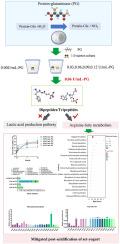Protein-glutaminase-derived small peptides mitigate post-acidification in yogurt by activating the arginine-fatty acid metabolic pathway
IF 6.6
1区 农林科学
Q1 FOOD SCIENCE & TECHNOLOGY
引用次数: 0
Abstract
Post-acidification remains a persistent quality defect in yogurt production. Enzymatic intervention can modulate it by regulating microbial metabolism. This study evaluated 0.00–0.12 U/mL protein glutaminase (PG) effects on post-acidification through fermentation kinetics and organic acid analysis. Notably, 0.06 U/mL PG controlled acidification, showing a Δ7 °T acidity increase and 9.06 mg/g lactic acid over 14-day storage, enhancing water holding capacity, viscosity, texture, and casein matrix compactness. Metabolomic and peptidomic analyses showed PG at this dose increased peptide concentration to 24.31 μg/μL, modifying 26 amino acids/small peptides (54.54 % tripeptides). After 14 days, enriched amino acids were linked to amino acid and fatty acid biosynthesis pathways. Gene-level investigations revealed upregulated arginine (argJ–H, 1.1–17.5-fold) and fatty acid synthesis genes (accA–fabK, 1.0–6.0-fold) in starter cultures, increasing membrane UFA/SFA ratios. Collectively, 0.06 U/mL PG treatment enhanced polypeptide levels, activated pathways for arginine, polyamines, and fatty acids, improved membrane fluidity, reduced post-acidification, and enhanced yogurt quality.

蛋白质-谷氨酰胺酶衍生的小肽通过激活精氨酸-脂肪酸代谢途径减轻酸奶中的后酸化
后酸化是酸奶生产中一个持续存在的质量缺陷。酶的干预可以通过调节微生物代谢来调节它。本研究通过发酵动力学和有机酸分析,评价了0.00-0.12 U/mL谷氨酰胺酶(PG)对后酸化的影响。值得注意的是,0.06 U/mL PG控制酸化,在14天的储存中显示出Δ7°T的酸度增加和9.06 mg/g的乳酸,增强了保水能力、粘度、质地和酪蛋白基质致密性。代谢组学和肽组学分析表明,PG使肽浓度增加到24.31 μg/μL,修饰了26个氨基酸/小肽(54.54%的三肽)。14天后,富集的氨基酸与氨基酸和脂肪酸的生物合成途径相连。基因水平研究显示,发酵剂中精氨酸(argJ-H, 1.1 - 17.5倍)和脂肪酸合成基因(accA-fabK, 1.0 - 6.0倍)上调,增加了膜UFA/SFA比率。总的来说,0.06 U/mL PG处理提高了多肽水平,激活了精氨酸、多胺和脂肪酸的途径,改善了膜流动性,减少了后酸化,提高了酸奶质量。
本文章由计算机程序翻译,如有差异,请以英文原文为准。
求助全文
约1分钟内获得全文
求助全文
来源期刊

LWT - Food Science and Technology
工程技术-食品科技
CiteScore
11.80
自引率
6.70%
发文量
1724
审稿时长
65 days
期刊介绍:
LWT - Food Science and Technology is an international journal that publishes innovative papers in the fields of food chemistry, biochemistry, microbiology, technology and nutrition. The work described should be innovative either in the approach or in the methods used. The significance of the results either for the science community or for the food industry must also be specified. Contributions written in English are welcomed in the form of review articles, short reviews, research papers, and research notes. Papers featuring animal trials and cell cultures are outside the scope of the journal and will not be considered for publication.
 求助内容:
求助内容: 应助结果提醒方式:
应助结果提醒方式:


